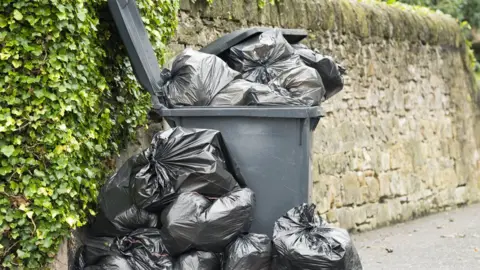Bath council may fine those who refuse to recycle
 Getty Images
Getty ImagesA council is considering fining people who refuse to recycle.
In a new action plan on waste, Bath and North East Somerset Council says it is looking at issuing fines to stop recyclables going to landfill.
Currently, 18% of people in the area do not recycle anything at all.
Liberal Democrat council leader Dine Romero said: "We need to make sure people know the value of recycling, for both the planet and the council's own resources too."
The new Climate Emergency and Sustainability Policy Development and Scrutiny Panel will be considered by the council next week.
Its aim is to set out proposals to help the council work with residents to "achieve the national 65% recycling target by 2035".
This would, the report says, make neighbourhoods "cleaner and greener", and deliver objectives of the climate and nature emergency.
 Getty Images
Getty ImagesThe council has kerbside collections for plastics, metals, clothing, paper, cardboard and food waste.
At present, 58% of its waste is recycled - seven per cent off the national target.
The authority is looking at other councils - Swindon, Mid Devon and Islington - which have said recycling was compulsory and then seen a noticeable increases in recycling rates.
Those councils asked recycling crews to report on which households had "recyclable materials in the black bin" and which had "no or little recycling being presented".
Ms Romero said a consultation was needed before any decision was made.
She said: "At present, we don't know why these people aren't recycling.
"It may be that they don't know they can recycle or have been misinformed."
The report states: "It is important to be serious about the possibility of fining, but many of the councils [which have also considered this] have never issued any fines.
"Further analysis shows that the first letter has always generated the most positive responses."
